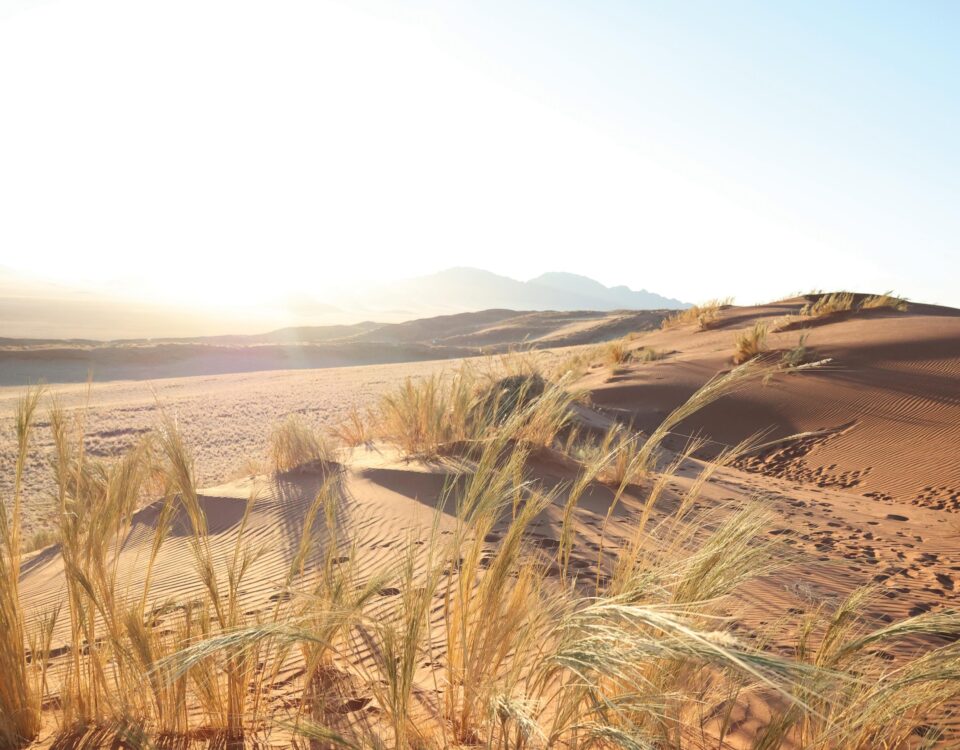Namibian Guestfarm Okomitundu
August 28, 2012Hoada Campsite – Damaraland
August 28, 2012Halfway through Etosha
by Ron Swilling
Situated midway between the Okaukuejo and Namutoni rest camps in the centre of Etosha National Park, Halali Rest Camp is set under large mopane trees, where the butterfly leaves lie scattered in copper patterns on the ground, long yellow winter grass blows in the wind and iridescent blue glossy starlings hop and swoop in between.
 Distinct and different in character from the other two camps, a dolomite outcrop with moringa trees clinging to the rocky soil provides a good viewpoint over the waterhole where anything from elephant, kudu and impala to guineafowl may be visible in the day, and black rhino and hyaena at night. If extremely fortunate, a glimpse of the secretive resident leopard is a nightly possibility.
Distinct and different in character from the other two camps, a dolomite outcrop with moringa trees clinging to the rocky soil provides a good viewpoint over the waterhole where anything from elephant, kudu and impala to guineafowl may be visible in the day, and black rhino and hyaena at night. If extremely fortunate, a glimpse of the secretive resident leopard is a nightly possibility.
Travelling from either direction, Halali provides a good stopover for lunch (pre-book for the buffet lunch) or as an overnight destination, with a visit to the Moringa waterhole.
It is definitely worth the higher national park fees to spend a night or two at the camps and for the opportunity to have a waterhole experience. The unusual position of being a voyeur, gaining a glimpse into the dynamics of the animal world, is priceless. Watching the vulnerability of a lone antelope at the waterhole at night, or a group of hyaena stopping for a drink while out on a hunting mission, takes you into the world of predator and prey, and the cycle and rhythm of nature stripped down to the basics. In the morning, watching kudus lower their swirled horns to the water to slake their thirst, impala jousting or an elephant group approaching as if materialised from a different reality, is an exceptional experience.
Amenities and services
Halali offers accommodation options ranging from camping (each site accommodating up to eight people, with water and electricity points, a barbecue area, communal kitchen and ablution facilities), to double rooms, bush chalets with barbecue facilities (with two and four beds, ideal for families) – two with access for disabled persons, self-catering family chalets and private luxury or honeymoon suites with a jacuzzi and a star-gazing window above the bed. The camp was renovated and refurbished to coincide with the 2007 centenary celebrations and all rooms have mosquito nets (it’s a low-risk malaria area), a mini fridge, air-conditioner, small veranda and tea-and-coffee facility.
The rest camp offers buffet dinners in the high season, à la carte in the low, with a selection of beef, pork and game meats, including crocodile. The breakfast chef is a master of the art of omelette making and stands at the buffet counter skilfully flipping eggs.
Halali boasts a large pool that glitters alluringly, a take-away kiosk, a bar, an info centre and a curio store. A fuel station provides essential fuel and a tyre-repair service, and deals with vehicle breakdowns in the area.
Activities
Three-hour game drives are offered, in the early morning, afternoon and night. As the visitor is not allowed to travel in the park after sunset, the night game drives have Etosha’s roads to themselves. Even if self-driving through Etosha, a guided game drive is recommended. The guides know the whereabouts of certain animals at various times of the day, their eyes are trained to recognise lion lying in the yellow grass and they offer valuable wildlife information, opening up the natural world for the visitor and making the Etosha sojourn complete.
The name ‘Halali’ is derived from the bugle call traditionally blown at the end of a hunt. Conveniently situated 75 km from both Namutoni in the east and Okaukuejo in the west, it offers, like its sister camps, the opportunity to experience the superb national park and its abundance of animals. It is common to see herds of different animals milling about a waterhole together, while a lion saunters to the water to take a drink or sits guarding the remains of a meal. The opportunity to view wild animals, especially the Etosha animals that are habituated to passing vehicles, is rare in today’s world where natural habitats are rapidly being destroyed and animals are increasingly becoming extinct, leaving our planet aesthetically and spiritually bereft. National parks remain precious pockets of wilderness to be enjoyed, appreciated and valued.
This article appeared in the Dec ‘09/Jan ‘10 edition of Travel News Namibia.

